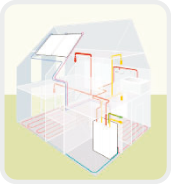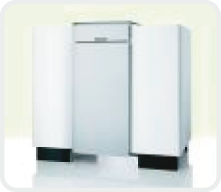Heat Pumps FAQs
Q. How
efficient is a heat pump system?
A. Modern systems are very energy efficient. For each kilowatt of
electricity used to run the heat pump, three to four kilowatts of heat are
delivered to the building.
Q. Why have I never heard of these systems before? Are they
new?
A. Around the world, particularly in the USA and several parts of Europe,
the use of heat pump systems is common. The ground source heat pump was
actually invented more than 50 years ago, and continuous development has
greatly improved its efficiency and reliability. It is now a proven,
cost-effective, safe and environmentally friendly alternative to fossil
fuels.
Q. How large are these units?
A. A typical heat pump unit for a domestic dwelling is about the same size
as a large fridge.
Q. Can it supply hot water for the house?
A. Yes. Virtually all heat pumps are able to heat domestic hot water via a
modern high efficiency indirect water cylinder either built in to the unit
or as a separate cylinder.
Q. Can the systems provide cooling?
A. Yes. We can provide reverse-cycle heat pumps that can deliver both heating and
cooling.
Q. Can I use a standard domestic electricity supply?
A. Yes. We supply and fit a number of heat pumps that have been specifically
designed to run on a standard UK single-phase supply.
Q. I am currently designing a new house that will be
extremely well insulated. Would a ground source heat pump system be worth
considering and is it straightforward to install?
A. Yes, absolutely. All new houses in the UK must be able to meet or exceed
Building Regulations, and from October 2010, these are now the new higher
standards for part L2. These mandatory regulations have been designed to
conserve fuel, reduce heat losses and ensure greater energy efficiency, and
so will ensure that all modern properties will lose less heat and need less
heating. This means that the size of heat pump is smaller, will need smaller
ground loops and will therefore be less expensive.
Q. My
architect suggests I install under floor heating in my new house. Is this
OK?
A. Yes. Heat pump systems are ideally matched to modern low temperature
under floor heating.
Q. I have an older style property. Can I still fit a heat
pump system?
A. Yes, you can, but your building must be well insulated for you to gain
most benefit. The cost of a system is directly related to its size and with
heat losses being fairly high from older buildings, this can add
substantially to the capital cost of installation. Money spent on upgrading
insulation levels can save a considerable amount on the capital cost.
Q. Can radiators be used inside my house instead of under
floor heating?
A. Yes, they can, but you will need larger radiators, sized for the typical
45° C to 50° C water temperatures obtained from heat pump systems. If your
house is really well insulated they may be suitable, but check to see how
big they would have to be and the space they would take up. There is now
available a wide range of very stylish Italian die cast aluminium, high
output radiators. These are very efficient and smaller than conventional
radiators. Upstairs is usually less of a problem as bedrooms are normally
kept at lower temperatures.
Q. Could
I install the heat pump outside or in my car-port, garage or basement?
A. Yes. There is generally no problem in doing so and it normally means the
pump is nearer to the pipe connections on your ground loops, which often
makes the whole system easier to connect. Some homeowners have made up a
small, well insulated, external enclosure for the pump unit.
Q. I have been told long trenches will have to be dug on my
land to house the ground loops but - my land is too rocky to dig trenches -
I don't have enough land to dig long trenches - what do I do?
A. Boreholes or compact collectors can be used instead of trenches for
ground source heat pumps. Alternatively an air source heat pump could be
used.
Q. How big are the trenches?
A. A typical heating-only installation for a medium sized, new build
detached house would need between 300 and 400m of 40mm pipe in the ground.
The trenches can be straight or curved and laid in any direction to suit
your site, providing they are always a minimum of 2 metres apart. A standard
excavator, such as the type used to dig conventional foundations and
footings, can dig the trenches and backfill them after the ground loops have
been installed. Once completed, and the ground loops pressure tested and
buried, your renewable energy collection system can basically be forgotten.
However, its location needs to be recorded to avoid accidentally digging it
up!
Q. Can I install trenches on a downward sloping site?
A. Yes, provided you can physically dig the trenches, a moderate downward
slope is not a problem. Consideration needs to be given to purging air from
a system with ground loops higher than the heat pump.
Q. I have some very wet land. Can I use this?
A. Yes, wet land is better at conducting heat so, as long as you can
physically dig a trench, its ideal.
Q. I
have a large pond. I have a stream. Could this be used?
A. Yes, it is possible to use very large ponds and fast flowing streams as
an energy heat source.
Q. Are heat pump systems really environmentally friendly?
A. Yes. In the UK, there is now a strong move towards alternative
technologies that are sustainable and environmentally much more acceptable.
It has been calculated that 40% of CO2 emissions are derived from the
heating of buildings. By using renewable sources of energy to heat your
property you can help to reduce these emissions, particularly when compared
to burning fossil fuels such as oil. Most electricity suppliers are now
offering 'clean green' electricity from a renewable energy source and, if
you use this to power your heat pump, your property will be totally heated
from renewable energy with zero carbon emissions.
Q. Are heat pumps dangerous? What about servicing and
maintenance?
A. There are no hazardous gas emissions, no flammable oil, LPG or gas pipes,
no flue or chimney and no unsightly fuel tanks. GSHP systems have absolutely
NO site emissions. There is no need for regular servicing or annual safety
checks and maintenance is very low.
Q. How do running costs compare with conventional
alternatives?
A. It depends what you are comparing. In a modern, well-insulated house, a
heat pump system can offer very high efficiency and moderate running costs.
An oil-fired boiler would cost considerably more to run, and electric
heating would be at least three times as expensive. It is true that the very
best of the modern condensing gas boilers may only be a little more
expensive to run but that is on current gas prices, which are set to rise.
Also, all fossil fuel boilers need regular servicing and maintenance.
Q. Are these systems expensive?
A. The initial purchase costs of a ground source heat pump system will be
quite a lot more than a conventional oil or gas-fired boiler. The initial
one-off expense is offset by the lower running costs, lower maintenance and
low servicing requirement. There is also the security of knowledge that the
majority of your heating and cooling energy comes out of your ground, is
under your control and will not increase in price.
Please contact us for more information on our heat pump solutions.

Contact Details
1 Lenziemill Road, Cumbernauld,
Glasgow. G67 2RL
T: 0870 242 7772
E: info@mmaxx.com


